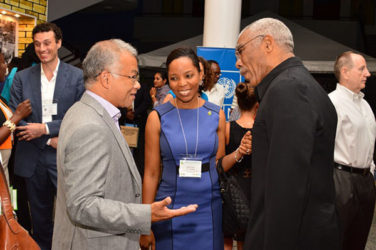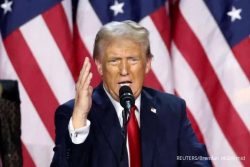The Fourth International Congress on Biodiversity of the Guiana Shield was declared open by President David Granger at the Arthur Chung Convention Centre on Monday, as efforts to protect and preserve a billion year old Guiana Shield intensify.
The congress is expected to run until Friday and sees participants from countries in the region coming together to share ideas and research on the Guiana Shield.
Delivering the keynote address, President Granger described the Guiana Shield as the “second Garden of Eden,” while emphasizing the presence of the rich and unique biodiversity that can be found in the Shield and its importance to the rest of the world.

With its pristine forest and presence of 15% of the world’s fresh water reserve, Granger noted that the shield is not only essential to replenishing the world’s biodiversity but also essential to the survival of Planet Earth.
This being said, he called for a three-pronged approach to be adopted for the effective protection and preservation of the Guiana Shield which incorporates the establishment of a scientific research institute, the creation of strong mechanisms for data and information sharing as well as the continuous sourcing of investors.
Elaborating on the need for the establishment of a functional scientific research institute, the President said that the Shield commands a common resource which requires regional cooperation and coordination. Thus, such an institution should be able to also function as a secretariat to coordinate efforts and combine the works of the shield’s six member states at the international level.
He suggested that action be taken to develop an inventory for the various species of flora and fauna, particularly those threatened with extinction. It was noted that because the Shield is so extensive, many of its areas are unreachable and still unexplored and the scientific community needs to gain access to these areas in order to study and document their biodiversity.
Underlining the importance of regional integration in the sustainable management of the shield, he said, “Efforts by one country to protect biodiversity must be supported by other member countries. The sustainable management of the shield must become a part of the regional integration process in South America so that a comprehensive biodiversity policy in the entire shield can be developed.”
The support of investors in this area is vital and he reminded the participants that the Guiana Shield provides environmental services to all of humanity and as such, incentives are needed to ensure that countries can keep their forests intact.
“Green economies need investment to sustain protected areas and for sustainable energy. The absence of investment will place pressures on the governments of the Shield, particularly, the three smallest states. If they are to move towards resource extractions and it may tempt them, perhaps, to go into directions, which lead to deforestation and destructive mining [and] which could have adverse effects on biodiversity,” he said.
“Ladies and gentlemen, we only have one world, and the world has only one Guiana Shield, we have the responsibility as custodians of the Guiana Shield and that responsibility imposes on us the duty to protect and preserve our unique patrimony,” he added.
Reverting to the hosting of the congress, the President acknowledged the role played by the members of the International Biodiversity Society of the Guiana Shield (IBG) in presenting the Shield’s importance to the continent, to the Caribbean and to the world. However, he urged them not to ignore the need for institutions, information and investment as means of ensuring the Shield’s ecological integrity.
Eternity
“This is a moment in eternity, which we cannot allow to slip by. This is the time for the scientific community, governments, non-governmental organizations and communities to forge partnerships to protect the Shield’s biodiversity, while allowing states to leverage the Shield’s high endemicity, cultural diversity and intact ecosystems for inclusive growth and secure futures,” he posited.
Similar sentiments were expressed by outgoing President of the IBG, Professor Marten Schalkwijk, who stressed the importance of local chapters in member countries, which he said contributes to a stronger regional network.
Alluding to the congress, he noted that it provides a useful opportunity to persons within the region who study different aspects of the ecosystem in the Guiana Shield to network and exchange ideas to ensure the future of this beautiful region
“Most of us here are a part of the Guiana Shield, and as participants from these countries, we have an important role to play and to make proper assessment of our environment, of its ecosystems and its biodiversity. This congress will provide another opportunity to make such an assessment and to tell our own societies and policy makers what we have discovered and what has to be done,” he said.
“We will share the results once more and continue our quest.
We must find ways to utilize what we have found and what we have not yet found to improve the way in which we live in our own ecosystems,” he added.
Further, he urged participants to work together during the congress to exchange ideas, present results of research and share information as biodiversity continues to be a very valuable asset that has not yet been thoroughly analyzed to reap its benefits.
Commenting on the activities for this year’s congress, the professor described it as being very impressive as it caters for discussions on 27 different subject areas and 124 paper presentations.
He further stated that this year’s congress will feature both experienced keynote speakers as well as some fresh faces.
Meanwhile, Vice Chancellor of the University of Guyana Professor Ivelaw Griffith announced that for the first time, the university will be offering a doctoral programme in biodiversity in the new academic year.
He also divulged plans to discuss the upgrading of the School of Earth Science to that of a Faculty.
Meanwhile, the congress, which was last held in Suriname in 2013, is an organized effort of the International Society on Biodiversity of the Guiana Shield (IBG). Other organization partners include the University of Guyana, Conservation International, the World Wildlife Fund (WWF), the United Nations Development Programme (UNDP), the Guiana Shield Facility, Iwokrama Research Centre, the Government of Guyana and the Guyana Society for Biodiversity and Ecosystems (GSBE).
At the end of the congress, participants will have the opportunity to visit Kaieteur Falls, the Iwokrama Rainforest, the Mangrove Reserve and several other notable eco-friendly resorts.




